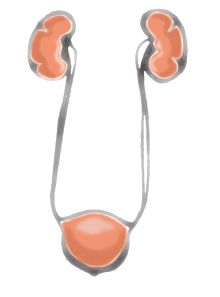Why do kidneys fail?
There are many different reasons for decreased kidney function. Two of the most common are diabetes and high blood pressure.
Diabetes
There are two types of diabetes: type 1 and type 2. Diabetes type 1 means that your body does not produce enough insulin to take care of the sugar in your blood. Diabetes type 2 means that you are not making effective use of the insulin you produce.
If diabetes is not controlled properly, sugar will start to build up in your blood. When the amount of sugar becomes too high it can cause damage which will reduce the ability of your kidneys to filter out waste products and fluids. Although treatment of diabetes has improved, many people with diabetes may still develop kidney damage after 20-30 years.
High blood pressure/Hypertension
High blood pressure occurs when the pressure of your blood against the walls of your blood vessels increases. High blood pressure will damage the small blood vessels in your kidneys and prevent the filtering process from working properly. The reasons for high blood pressure are to a large extent unknown. However, in many cases they seem to be connected with your general health, lifestyle and diet.
Kidney inflammation (glomerulonephritis)
Another common type of kidney disease is inflammation in the kidney’s filtering units. This may cause a decrease in the output of urine, the spilling of blood and protein into the urine, and swelling of eyelids, hands and feet (oedema).
Other causes for kidney failure
Polycystic kidney disease is an inherited disease which can cause large cysts to form in the kidneys and lead to kidney failure.
Obstructions in the outflow of urine cause urine to flow back up to the kidneys which may damage the kidneys. Obstructions can be caused by narrowing of the urethra which often develops before birth, kidney stones, tumors or an enlarged prostate gland in men.
Repeated urinary infections may also be a reason for kidney failure.
Causes unknown
About 20 per cent of dialysis patients never find a cause of their kidney failure. These patients often come for treatment for the first time when their kidney failure is far advanced and at this stage it is difficult to establish the reason for their disease.

